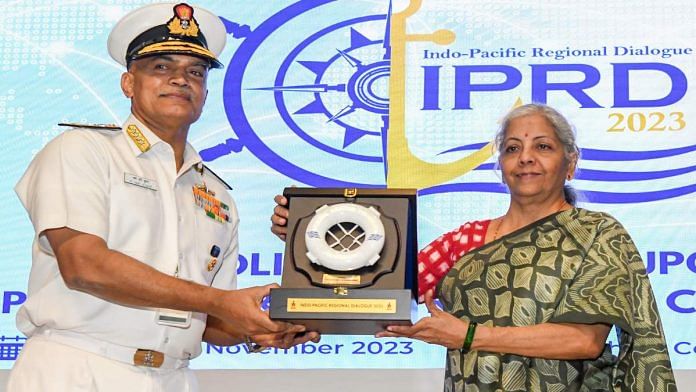New Delhi: The ongoing conflict in Israel and Gaza could be a challenge to the India-Middle East-Europe Economic Corridor (IMEC), Finance Minister Nirmala Sitharaman said Wednesday.
Addressing the Indo-Pacific Regional Dialogue, an annual international conference organised by the Navy, Sitharaman said IMEC would be a win-win for all the countries involved as it seeks to enhance transportation efficiency, reduce logistical costs, increase economic unity, generate employment and lower greenhouse gas emissions, “contributing to a cleaner, safer better world”.
“However, it is not without its geopolitical challenges and the ongoing conflict in Israel and Gaza is a worrying manifestation of this,” she added.
The IMEC is a big-ticket project that envisages a multi-modal network — from railways to roads and waterways — to enhance economic development through enhanced connectivity and economic integration. It was unveiled during the G20 Summit in New Delhi this September.
Sitharaman said the IMEC is “one of the most promising connectivity projects that we have embarked upon”.
The corridor, she added, begins with an “eastern corridor”, which is predominantly maritime in nature. It will connect Indian ports such as Jawaharlal Nehru Port in Navi Mumbai, and Mundra and Kandla in Gujarat, with West Asian ones such as Fujairah, Jebel Ali and Abu Dhabi in the UAE, and Dammam, Ras Al-Khair and Ghuwaifat in Saudi Arabia.
A rail segment will then provide connections to Saudi Arabian cities and onward to the port of Haifa in Israel (through Jordan), she added.
“The final segment, which some call a ‘northern corridor’, will once again be a maritime segment connecting the port of Haifa to the Great Port of Piraeus (Greece) and from there on to Europe,” Sitharaman said.
Also Read: At China-led SCO, Jaishankar bats for debt-free connectivity projects for ‘Global South’
On the Indo-Pacific
Speaking at the event, Sitharaman also weighed in on the China-US rivalry for primacy in the Indo-Pacific.
Successive editions of the Indo-Pacific Regional Dialogue, she said, continue to “sensitise us to the fact that two broad systems are currently engaged in a global competition centred upon the Indo-Pacific”, a region that accounts for “65 percent of the world’s population… 60 percent of global GDP and almost 50 percent of global merchandise trade”.
Of the “two systems”, she said, “One draws its legitimacy from an internationally accepted and consensually derived rules-based order”.
“India stands firmly and proudly in the vanguard of this system,” she added.
The other, the minister said, “seeks to discredit and disrupt this consensually derived rules-based order and supplant it with an international order whose rules are generated in an exclusive state”.
Amid this competition, Sitharaman said, “middle powers are exploring a variety of options of engagement that could provide them with an assurance of peaceful pursuit of geopolitical goals that are in keeping with the individual national interest as well as their global and regional concerns”.
She also said that, over the foreseeable future, India’s comprehensive national power is going to remain inextricably linked to the ocean. India’s focus, she added, was to transition from a brown economic model to a blue economic one, and thereafter extrapolate the blue transition across the length and breadth of the Indo-Pacific.
India was shouldering “greater and heavier regional responsibilities”, she said.
“Even as the world appreciates India’s achievements and successes and lauds it for demonstrated resilience amidst multiple crises, we are very clear that we cannot afford to be an inward leaning power.”
She noted that despite the multiple conflicts underway in the world, India’s economy had remained resilient.
“Amidst the gloom of supply-chain disruptions, the economic turbulence generated by contemporary conflicts that impact the Indo-Pacific, irrespective of whether they are occurring in relatively distant Ukraine, or in relatively proximate Israel or Yemen and despite the palpable tensions prevalent in the South and East China Sea, the Indian economy stands out as a bright spot,” she said.
(Edited by Sunanda Ranjan)
Also Read: For IMEC to have any real impact, fix the finance first. Only then it can counter China’s BRI



